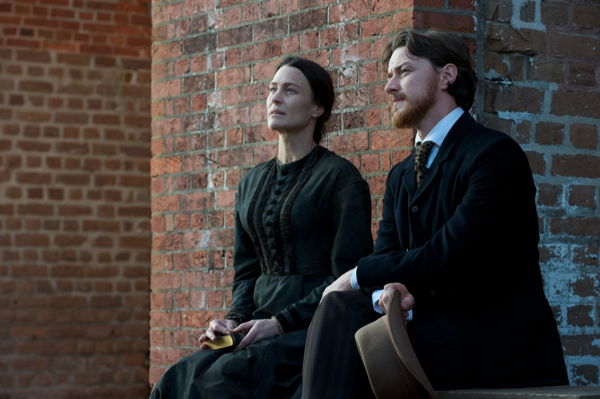Movie review by Greg Carlson
Stiff, sober, and fastidious to the brink of suffocation, Robert Redford’s “The Conspirator” recounts the trial of accused Lincoln assassination abettor Mary Surratt, whose boarding house frequently entertained Confederate sympathizers. Presented as a grave and airless history lesson, far too much time is spent in the stifling makeshift courtroom where the wan accused faced a stacked-deck military tribunal of revenge-minded officers. Redford never gets outside the margins of our worst impressions of the dusty, distant past, and “The Conspirator” grinds methodically through its rigidly chronological, one-thing-at-a-time study of the shortsightedness of a system willing to violate its own principles.
As Michael Phillips has aptly pointed out, the movie filters its point of view through the “wrong character,” testy war hero and reluctant legal defender Frederick Aiken (James McAvoy). As a direct result, the film is misleadingly titled, for Robin Wright’s Mary Surratt remains distant and unknowable from first prison meeting to final gallows drop. Even as the accumulation of reasonable doubt begins to sway the opinion of Unionist Aiken, the audience is given no incentive to sympathize with Surratt. Only briefly, when the bonds of mother love are exploited through daughter Anna (Evan Rachel Wood) and fugitive son John (Johnny Simmons), does Redford graze an opportunity to capitalize on any viewer compassion.
Filmic and television dramatizations of the evening of Abraham Lincoln’s murder number in the dozens, and Redford’s brisk opening act rushes through the template made famous in 1915 by D.W. Griffith in “The Birth of a Nation.” It is the aftermath, and not the details of April 14, 1865 that concerns Redford’s production – a daunting prospect given that scenes of people asking and answering questions in a single room lack the cinematic intensity of images like Booth’s leap to the stage of Ford’s Theatre and his unbelievable horseback escape.
Screenwriter James Solomon has claimed that he wrote “The Conspirator” with no parallels to contemporary United States policy in mind, but this has not stopped critics from linking the film’s release to the government’s decision to try Khalid Sheikh Mohammed by military tribunal. Spending any significant time mulling similarities is a fool’s errand, given the grueling task of slogging through Redford’s long-winded tale and its failure to generate excitement. With a handful of exceptions, including the Tom Robinson trial in “To Kill a Mockingbird,” the courtroom drama is among the least visually appealing genres in the movies. Thousands of hours of it floating by weekly on the small screen doesn’t help either.
Solomon, for reasons unknown, deletes several of the most culturally enshrined pronouncements and exclamations associated with the depicted events. Kevin Kline’s heavy, mean Edwin Stanton does not utter “Now he belongs to the ages/angels,” and virtually none of the execution site banter accompanies the climactic scene, including Surratt’s last words “Please don’t let me fall.” Even without the exacting detail demanded by some Lincoln fanatics, the hanging of the condemned shows off Redford’s finest instincts as a filmmaker, but the gripping sequence, like Aiken’s attempts to secure clemency for Surratt, proves too little, too late.
